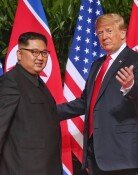6 Risk Factors Facing Global Economy
6 Risk Factors Facing Global Economy
Posted September. 19, 2006 06:54,
What if inflation continues? What if the U.S. housing market goes into recession? What if global trade tumbles due to failed FTA negotiations?
Experts of the International Monetary Fund (IMF) pointed to six risk factors for the global economy next year ahead of the IMF-World Bank Annual Meetings, which will be held in Singapore from September 19 to 20, according to the Observers report on September 17.
What if inflation reemerges?
Central banks used to believe that high-volume low-cost products supplied by China and India will contribute to scaring away the specter of inflation. However, high oil prices that have tripled since 2000 are posing threats. Economists are bracing for the worst-case scenario where prolonged economic downturn will lead to inflation.
What if the oil prices soar again?
International oil prices, which once reached 80 dollars per barrel, have come down to 65 dollars per barrel. The main driver of the recent oil price hike was the skyrocketing demand in newly emerging economies like China and India. The IMF has warned that oil supply disruptions in any of oil producing countries like Iran, Nigeria and Iraq can deal a serious blow to the global economy. The oil shock in the 1970s was also triggered on the supply side not the demand side.
What if the recession in the U.S. housing market leads to the market collapse?
Thanks to low interest rates, U.S. housing prices have more than doubled since 1995. Nevertheless, there can be a great confusion once the bubble bursts in the housing market. Some argue that the growth of Europe and Japan can support the U.S. economy, but it is more likely to cause confusion in the financial market which will ultimately weaken the U.S. economy as a whole.
What if investors turn their backs on the debt-laden American economy?
American consumers are borrowing 2 billion dollars a day by mass purchasing cheap imports from China and India. Meanwhile, emerging economies like China are accumulating their foreign reserve. The IMF is concerned that such global trade imbalance can weaken the dollar to make the U.S. economy less attractive to investors and to drive the global economy into recession in the end.
What if a geopolitical crisis happens in the Middle East?
The IMF has warned that the financial market will not be able to withstand possible turbulences in the Middle East, such as a resumption of nuclear program by Iran and increased violence in Iraq and Afghanistan. Economists say that geopolitical variables, including a war with Iran, Avian Influenza (AI), pose the greatest threat to the stability of the global economy.
What if unemployment provokes a political backlash?
A fast slowdown of the U.S. economy and rising unemployment can give rise to antipathy toward China and other countries exporting low-cost products. There is much concern surrounding the possibility of a trade dispute as U.S. congressmen are threatening a bill to levy a 27.5 percent tariff on Chinese exports unless China revalues its currency.
spear@donga.com






